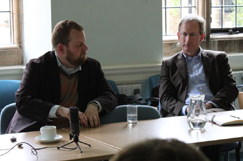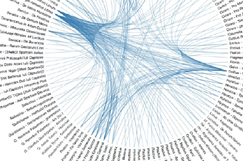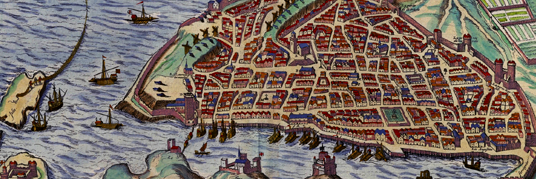* You are viewing Posts Tagged ‘France’
James Brown
July 17, 2012
Conferences and Workshops, Events, Podcasts, Project Updates
Tags: England, France, John Wallis, Martin Lister, Networks, Pierre Bayle, Pierre des Maizeaux
Convened by Philip Beeley and Martine Pécharman, the workshop is a letter-specific installment of the MFO’s ongoing series Across the Channel: Intellectual Relations between England and France in the Early Modern Period, and will feature epistolary talks from Antony McKenna (on Pierre Bayle), Anna Marie Roos (on Martin Lister), and Ann Thomson and Sébastien Drouin (on Pierre des Maizeaux). The workshop will be held at the Maison, and there’s no need to register; for further details, please visit the workshop webpage.
James Brown
June 12, 2012
Events, Lectures, Podcasts, Project Updates, Websites and Databases
Tags: Digitization, Editions, Electronic Enlightenment, France, Mapping the Republic of Letters, Networks, Text Mining, Visualization
 Podcast available on the seminar page!
Podcast available on the seminar page!
In the fourth paper of our seminar series on Thursday 17 May, Dr Glenn Roe – formerly of the University of Chicago, and current Mellon Fellow in Digital Humanities at Oxford’s OERC – gave a sophisticated and suggestive paper on ‘Text-Mining Electronic Enlightenment: Influence and Intertextuality in the Eighteenth-Century Republic of Letters’.
.
Building on his recent work with the Electronic Enlightenment corpus and other online repositories of long-form historical text, Glenn started his talk by observing the irony that the recent efflorescence of big data, culturomics, network analysis, and other quantitative approaches to culture – focusing in many cases on the macro interpretation of metadata over content – has authorized and promoted a convention of ‘not reading’ within the digital humanities, in which historical texts themselves can be marginalized or effaced altogether by the superabundance of information. The ready modelling of letters as a finite number of abstract datapoints (sender, recipient, and so on) and the vast quantities of diverse and often disorganized information exchanged within epistolary systems makes correspondence highly susceptible to such an approach.

Glenn during discussion.

Visualizing influence.
As a supplement to this ‘distant’ reading, Glenn went on to demonstrate the potential of the latest machine-learning technologies to render significant volumes of transcription meaningful via text mining and the automated creation of patterns, frequencies, statistical models, and other forms of ‘mediated’ or ‘directed’ reading. Glenn distinguished between three kinds of text mining: predictive classification (used to generate new categories from unprocessed texts); comparative classification (used to correct and refine existing categories within processed texts); and similarity (used to measure broader similarities between documents and parts of documents, especially in terms of the identification of meaningful borrowing and instances of intertextuality). He then demonstrated each kind of approach within a rich series of examples drawn from his work with the ARTFL Encyclopédie Project, and most recently Electronic Enlightenment, before concluding his analysis by presenting – with caveats – some preliminary radial visualizations of textual influence generated using the D3 JavaScript library.
Following on from November’s workshop, a second installment of Across the Channel: Intellectual Relations between England and France in the Early Modern Period will take place at the Maison Française D’Oxford on Tuesday 28 February 2012. Organised by Martine Pécharman and our very own Philip Beeley, this boutique event will allow five invited scholars to explore Anglo-French exchanges from a variety of perspectives in the context of rich case studies. For the full programme, see the workshop webpage; all are welcome.
Cultures of Knowledge hopes to collaborate on and co-produce a third Across the Channel workshop later in 2012. Watch this space!
James Brown
February 21, 2011
Project Updates, Publications, Websites and Databases
Tags: Bodleian Resources, Europe, France, History of Medicine, Martin Lister, Montpellier, Networks, Seventeenth Century
 In 1663, Martin Lister left his parents’ house in Burwell, Lincolnshire to study medicine in Montpellier. Whilst in France, he kept a journal in an almanac entitled Every Man’s Companion: Or, An useful Pocket-Book (MS Lister 19, Bodleian Library).
In 1663, Martin Lister left his parents’ house in Burwell, Lincolnshire to study medicine in Montpellier. Whilst in France, he kept a journal in an almanac entitled Every Man’s Companion: Or, An useful Pocket-Book (MS Lister 19, Bodleian Library).
Month by month, Lister noted the medical texts he consulted (and the French romances and comedies he read) in this thin octavo, and annotated the recipes given to him when he lodged with an apothecary. He described the personalities and works of luminaries he met in France including William Croone, Nicolas Steno, and John Ray. Lister performed a series of dissections with Steno, as well as going on natural history expeditions with Ray. Lister also attended the salon of Sir Thomas Crew to discuss ornithology, medicine, and literature, mixing with other fellows of Cambridge and English expatriates. As his time in Montpellier was part of his education as a gentleman, Lister made detailed notes about his visits to gardens and libraries in Paris, manufacturing methods, viniculture, literature and drama, and rules of politesse and art connoisseurship.
Dr Anna Marie Roos, our Lister Research Fellow, has recently been awarded a British Academy Small Research Grant to create a textual edition of the pocketbook with appropriate apparatus. To annotate the edition, she will also utilize 25 pages of memoirs of Lister’s time in Montpellier and 43 pieces of Lister’s French correspondence in the Bodleian Library and in France. As the account of Lister’s journey is so detailed, his grand tour and memoirs will also be recreated as an interactive website using maps, images, and texts, providing a virtual introduction to an early modern medical education.

Marseille in 1575. View sourced from Historic Cities.
In the eighth and final installment of the Project’s inaugural seminar series on Wednesday 23 June, held in conjunction with the conference John Selden (1584–1654): Scholarship in Context, Professor Peter Miller (Bard Graduate Center) delivered a wide-ranging overview of ‘Peiresc’s Mediterranean Merchant Network’. Focusing on the letters sent by the polymath from Marseille in the early seventeenth century, Miller elaborated a fascinating story of ‘Peiresc and the sea’ in four parts (which focused respectively on Marseille, space and time in the Mediterranean, merchants, and names). The small, fast nature of Marseillaise ships, especially compared to Venetian craft, meant that letters dispatched from the French port arrived at their destinations quickly (reaching Leiden, for example in fifteen days), and Peiresc’s epistolary activities in the Mediterranean were reliant on an extensive maritime network of non-elite merchants, captains, and sailors, whose identities are in many cases painstakingly recorded (along with other names and biographies) in the letters themselves. This means that it is possible to reconstruct this particular correspondence ‘cloud’ (in Miller’s phrase) in particular detail, and during discussion he provided us with a tantalising glimpse into his forthcoming digitisation initiative which will both visualise Peiresc’s Mediterranean network and link it in an innovative way to an online monograph. For past lectures in the series, please see the seminar webpage; details of the 2011 series will be available shortly.
James Brown
June 23, 2010
Events, Lectures, Project Updates
Tags: Digitization, Europe, France, Isaac Casaubon, Joseph Justus Scaliger, Low Countries, Richard Thomson, Seventeenth Century
In the seventh and penultimate installment of the Project’s seminar series on Thursday 10 June, a large audience enjoyed papers by Dr Dirk van Miert (Huygens Institute) and Dr Paul Botley (Warburg Institute), both postdoctoral fellows on the Scaliger Correspondence Project, established by Professor Anthony Grafton. In his opening contribution, van Miert explored ‘The Seventeenth-Century Culture of Editing Scholarly Correspondences: The Case of Joseph Scaliger’. Via a fascinating case study of several early seventeenth-century editions of the correspondence of the French scholar (especially that prepared by Daniel Heinsius), he argued that in an early instance of the ‘institutionalisation’ of the Republic of Letters it was increasingly common for lavish printed editions of the correspondence of intellectuals to appear during or immediately after their lifetimes, often prepared by former students (Heinsius studied under Scaliger). In his concluding contribution, Botley switched the focus to two less high-profile denizens of the Republic of Letters in a paper entitled ‘The Letters of Isaac Casaubon (1559–1614) and Richard Thomson (c.1570–1613)’. Botley described his attempts to bring Casaubon’s c.2400 surviving letters (254 exchanged with Scaliger) to a wider scholarly audience by means of a definitive online edition, and introduced us to the letters of the little-known philologist and Church of England clergyman Richard Thomson, a regular correspondent of both Scaliger and Casaubon. Seminars take place in the Faculty of History on George Street on Thursdays at 3pm. For past seminars in the series, please see here.
 Podcast now available on the seminar page!
Podcast now available on the seminar page!
Update: Podcasts now available!



 In 1663,
In 1663, 

 Join
Join 